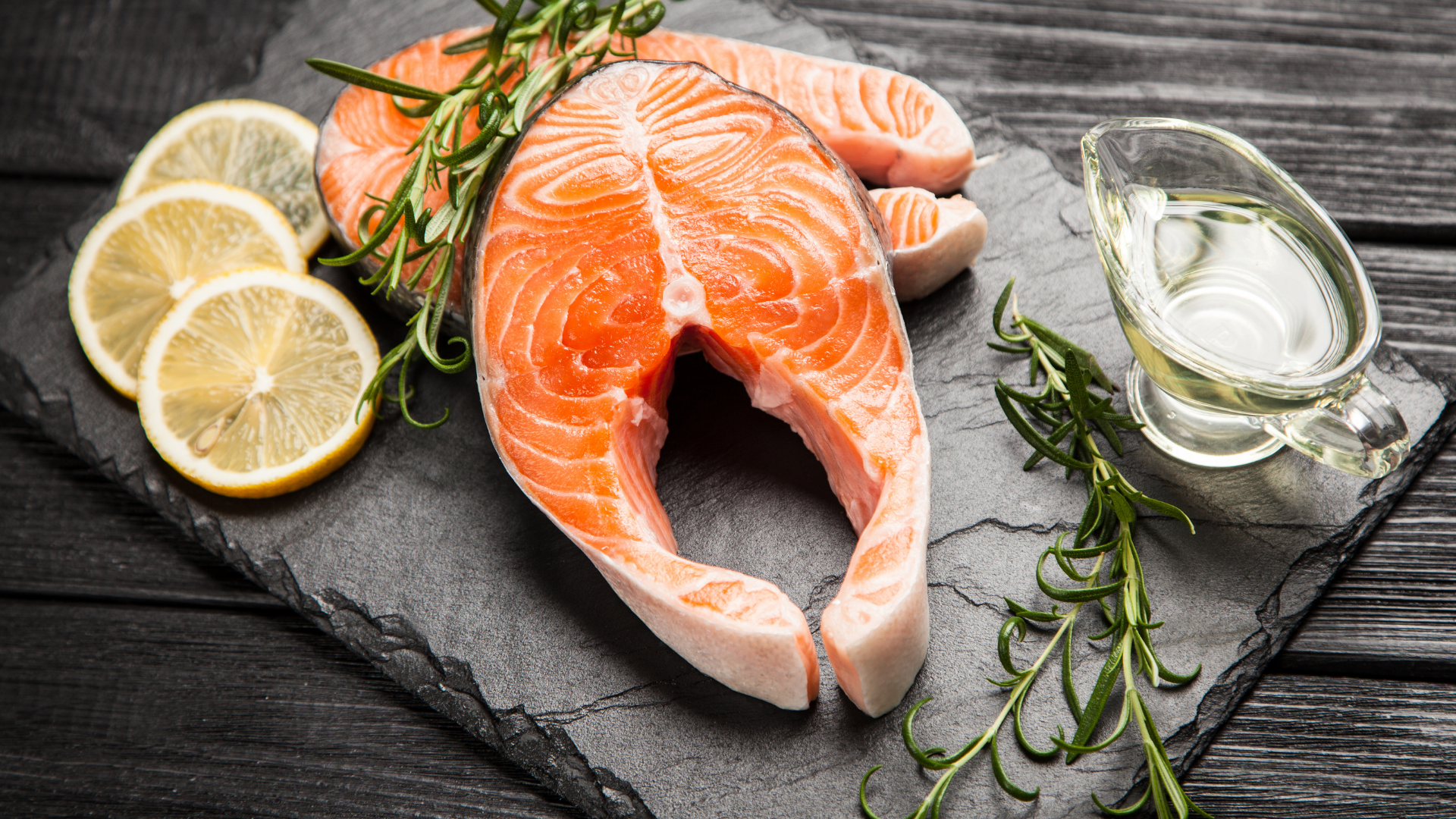
Essential fatty acids are the fats you can only get through diet; your body can’t make them. The two essential fatty acids are alpha-linolenic acid (ALA), an omega-3 fat and linoleic acid, an omega-6 fat.
Enzymes in your body convert ALA into longer chain omega-3 fats known as eicosapentaenoic acid (EPA) and docosahexaenoic acid (DHA). These fats are crucial for your health and wellbeing.
What omega-3 fats do
Every human cell has a protective, permeable membrane. These membranes hold water, vital nutrients and electrolytes. They regulate what goes in and out of the cell and help cells communicate with each other.
Omega-3 fats, EPA and DHA, are vital components of the cell membranes in the nervous system, brain and retina. You need EPA for concentration and vision, while DHA is critical for brain development, especially in fetuses and young children.
Omega-3 fats (mainly EPA) are also transformed into compounds known as series 3 prostaglandins. These prostaglandins have a range of beneficial anti-inflammatory effects. For example, they can thin the blood, break down blood clots, improve blood flow, and although the evidence is conflicting, prevent heart disease.
Omega-3 fats are beneficial in various health conditions, including psoriasis, heart disease, and rheumatic diseases.
Where to get omega-3
Vegetable oils (rapeseed and flaxseed), flaxseeds, chia seeds, sunflower seeds, walnuts, green leafy vegetables and soy products are good alpha-linolenic sources of acid. Your body needs to convert them into the crucial, longer-chain EPA and DHA omega-3 fats. However, this conversion process is inefficient; Research suggests that only approximately 2-10% of alpha-linolenic acid is converted into EPA or DHA.
Oily fish, including herring, mackerel, halibut, trout, kipper and salmon, contain preformed EPA and DHA and are thus better sources of omega-3 fats than plants. Oily fish tend to accumulate their omega-3 fats in their flesh so that you can absorb more EPA and DHA from them. Whitefish such as cod, haddock, plaice, and mullet also contain omega-3, but it is more concentrated in their livers. If you avoid fish for ethical or religious reasons, algal oils are an alternative source.
Signs you may be omega-3 deficient.
- Constipation
- Cracked nails
- Depression
- Dry hair and skin
- Dry mucous membranes
- Fatigue
- Frequent infections
- High blood pressure
- Low immunity
- Poor coordination
- Poor memory
Please note that these symptoms are not exclusive to an omega-3 deficiency. Other health conditions or nutritional deficiencies may also cause them.
The daily recommended intake
There is no specific recommended daily dose for omega-3 in the UK. However, the guidelines suggest we should eat two portions of fish (at least one oily) weekly. In the US and Canada, the daily recommendation for alpha-linolenic acid is
- 1-3 years: 0.7g
- 4-8 years: 0.9g
- 9-13 years: 1.2g males, 1.0g females
- 14-18 years: 1.6g males, 1.1g females, 1.4g pregnant females, 1.3g nursing females
- 19+ years: 1.6g males, 1.1g females, 1.4g pregnant females, 1.3g nursing females
Do you need to supplement?
Food is always the best source of omega-3 because it provides other essential nutrients (protein, vitamins and minerals) that your body needs for health.
Moreover, fresh fish is superior to supplements at increasing ‘good’ high-density lipoprotein-cholesterol (HDL-C), reducing triglyceride to HDL-C ratio and reducing ‘bad’ low-density lipoprotein (LDL-C) levels.
However, if you’re unable to eat sufficient quantities of oily fish or follow a restrictive (e.g. vegan) diet, you may need a supplement. That said, the U.S. Food and Drug Administration hasn’t approved omega-3 supplements to treat, cure or prevent any disease.
In summary, omega-3 fats are essential for health.
Aim to eat at least 2 portions of fatty or oily fish such as salmon, mackerel, herring and sardines weekly.
Where possible, eat fresh fish instead of using supplements. Fresh fish is superior to supplements; it is more effective at lowering heart disease risk and provides other essential nutrients absent in supplements.
References
- Calder, P. (2013) Omega-3 polyunsaturated fatty acids and inflammatory processes: nutrition or pharmacology? British Journal of Clinical Pharmacology, 75(3), 645-662.
- McNamara, R.K., and Carlson, S.E. (2006) Role of omega-3 fatty acids in brain development and function: Potential implications for the pathogenesis and prevention of psychopathology. Prostaglandins, Leukotrienes and Essential Fatty Acids, 75(4-5), 329-349.
- Balbás, G.M., Regaña, M.S., and Millet, P.U. (2011) Study on the use of omega-3 fatty acids as a therapeutic supplement in treatment of psoriasis. Clinical Cosmetic and Investigational Dermatology, 4, 73-77.
- Fard, S.G., Wang, F., Sinclair, A.J., Elliott, G., Turchini, G.M. (2018) How does high DHA fish oil affect health? A systematic review of evidence. Critical Reviews in Food Science and Nutrition, 59 (11), 1684-1727.
- Li, R., Jia, Z., and Zhu, H. (2019) Dietary supplementation with anti-inflammatory omega-3 fatty acids for cardiovascular protection: Help or Hoax? Reactive Oxygen Species, 7(20), 78-55.
- Bäck, M., and Hansson, G. (2019). Omega-3 fatty acids, cardiovascular risk, and the resolution of inflammation. FASEB Journal, 33(2), 1536-1539.
- Akbar, U., Yang, M., Kurian, D., Chandra, M. (2017) Omega-3 fatty acids in rheumatic diseases. Journal of Clinical Rheumatology, 23(6), 330-339.
- Goyens, P.L.L., Spilker, M.E., Zock, P.L., Katan, M.B., Mensink, R.P. (2005) Compartmental modelling to quantify α-linolenic acid conversion after longer-term intake of multiple tracer boluses. Journal of Lipid Research, 46(7), 1474-1483.
- National Institutes of Health Office of Dietary Supplements. Omega-3 Fatty Acids Fact Sheet for Health Professionals. Available: https://ods.od.nih.gov/factsheets/Omega3FattyAcids-HealthProfessional/. Last accessed: March 30 2021.
- Hilleman, D.E., Wiggins, B.S., and Bottorff, M.B. (2020) Critical differences between dietary supplement and prescription omega-3 fatty acids: A narrative review. Advances in Therapy, 37(2), 656-670.
- Zibaeenezhad, M.J., Ghavipished, M., Attar, A., and Aslani, A. (2017) Comparison of the effect of omega-3 supplements and fresh fish on lipid profile: a randomised, open-labelled trial. Nutrition and Diabetes, 7(12), 1.


